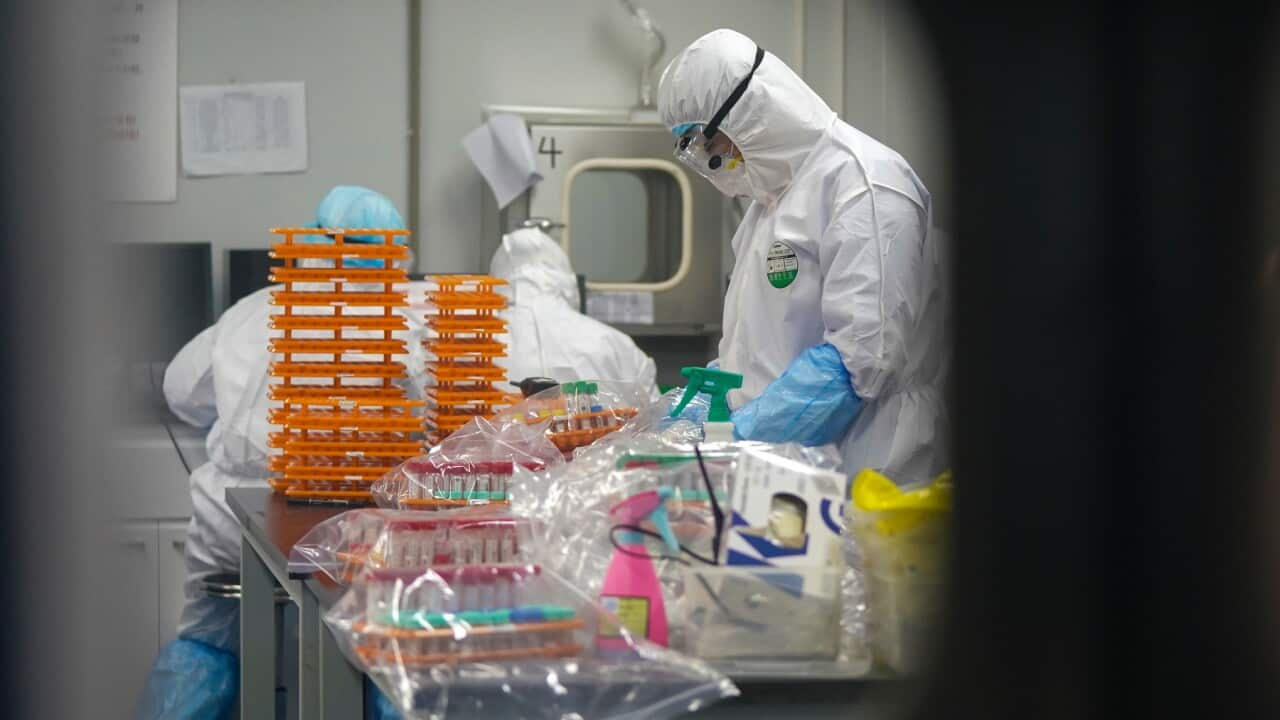All international arrivals in Beijing must undergo two weeks of quarantine, a city official said on Wednesday, as China tries to limit imported cases of the new coronavirus.
Beijing had already required quarantine for people arriving from hard-hit countries including South Korea, Iran, Italy and Japan but Zhang Qiang, a city government official, said at a press conference that those landing from any nation would now face 14-day isolation. The measures come as China announced that key companies can resume work in coronavirus-hit Wuhan, in another sign authorities are confident the quarantined city is winning its battle against the epidemic.
The measures come as China announced that key companies can resume work in coronavirus-hit Wuhan, in another sign authorities are confident the quarantined city is winning its battle against the epidemic.

A man wears a face mask as a preventive measure against the COVID-19 coronavirus as he walks through an almost empty Beijing Capital Airport Source: AFP
Yesterday, President Xi Jinping paid his first visit to the capital of Hubei province since it was placed under lockdown in late January after the outbreak became a national emergency.
The number of daily new cases has fallen steadily in Wuhan in recent weeks, while all other cities in Hubei have reported zero fresh infections for several days in a row - prompting Xi to declare that the spread of the virus has been "basically curbed" in the province.
The Hubei provincial government said on Wednesday that Wuhan businesses involved in providing daily necessities, prevention and control of the epidemic, or in the operations of public utilities, are among those that can resume work and production immediately.
Wuhan firms that are key to "global industrial chains" may do so as well, after getting approval, the government added. Other companies are expected to resume production only after 20 March.
Other companies are expected to resume production only after 20 March.

China says the epicentre of the coronavirus outbreak Hubei would relax travel restrictions to allow healthy people to move within the hard-hit province. Source: AFP
Japanese car-marker Honda said on Wednesday that some of its staff have started going to work in its Wuhan plant.
Honda has also begun production of a "small number of vehicles" while checking on its production equipment starting Wednesday.
Similar rules apply to areas outside Wuhan that are considered high-risk, where companies involved in epidemic prevention, public utilities and providing necessities are among those that may resume work.
In areas considered medium or low risk, there is a broader range of companies allowed to return to work.
Passenger flights, trains, cars, ships and city buses in middle and low-risk areas - moving within the province and excluding Wuhan - will "gradually resume operations" as well, although no timeframe was given.
But authorities said they will continue strict control measures on channels out of Wuhan and Hubei.
Health codes
The announcement came a day after Hubei authorities loosened travel restrictions, allowing people from medium and low-risk areas to move within the province if their health code is labelled "green".
A mobile app will be used to give residents a coloured health code. Green indicates holders have no contact with virus cases, while those with yellow codes are close contacts.
Confirmed or suspected cases will get a red code and must be quarantined. Authorities added in the latest statement on Wednesday that outside of Wuhan, a "point-to-point" system will be adopted to send employees back to work, and help those stranded in Hubei to return home.
Authorities added in the latest statement on Wednesday that outside of Wuhan, a "point-to-point" system will be adopted to send employees back to work, and help those stranded in Hubei to return home.

A medical staff member sprays disinfectant at a residential area in Wuhan in China's central Hubei province Source: AFP
Schools will continue to be suspended in Hubei.
Wuhan city has been on lockdown since 23 January as China scrambled to contain the spread of the deadly coronavirus, which has now killed over 3,100 and infected nearly 81,000 in the country.
Other cities in Hubei soon followed suit, placing a total of around 56 million people under quarantine.
Most of China's cases and deaths came from Hubei, with the majority in Wuhan.
But with cases falling dramatically in the province, residents have been clamouring for restrictions to be eased.
On Thursday morning, there were 124,578 confirmed cases of the coronavirus, of which 66,702 had recovered.
A total of 4,584 people had reportedly died from the pandemic.


